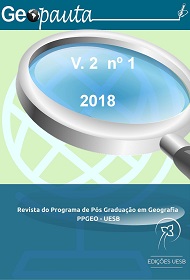The work in solid waste recycling cooperatives: a study of Recicla Conquista
DOI:
https://doi.org/10.22481/rg.v2i1.3857Keywords:
Waste management. Selective collect. Cooperativism.Abstract
The urban consumer society of contemporaneity contributes greatly to the increase of the amount of waste in the cities. Most of this production is difficult to decompose. In addition, the inappropriate disposal of garbage has emerged as a problem for analysis. Therefore, the present research aimed to analyze the contribution of a local cooperative as an agent responsible for reducing the ills caused by consumerism, in addition to understanding its importance for the cooperative. From the results, it can be verified that the Recicla Conquista, despite bringing clear contributions to the environment and to the cooperative, presents failures of self-management, besides being little contemplated by public policies.
Downloads
Metrics
References
ALIGLERI, Lilian; ALIGLERI, Luiz Antonio; KRUGLIANSKAS, Isak. Gestão socioambiental: responsabilidade e sustentabilidade do negócio. São Paulo: Atlas, 2009.
ABNT - Associação Brasileira de Normas Técnicas. NBR 10004:2004 – Resíduos sólidos – classificação. Rio de Janeiro, 2004.
Associação Brasileira de Empresas de Limpeza Pública e Resíduos Especiais (Abrelpe). Panorama de Resíduos Sólidos no Brasil- 2014. São Paulo: Abrelpe; 2014
DIAS, Reinaldo. Gestão ambiental: responsabilidade social e sustentabilidade. São Paulo: Atlas, 2007.
GARCIA, Marcio Barreto Santos et al. Resíduos sólidos: responsabilidade compartilhada. Semioses, Bonsucesso v. 9, n. 2, p. 77-91, 2016.
MESQUITA JÚNIOR, José Maria de. Gestão integrada de resíduos sólidos. Coordenação de Karin Segala. Rio de Janeiro: IBAM, 2007.
OLIVEIRA, Ana Paula da Costa. A participação do consumidor-gerador de resíduos e sua contribuição no instrumento da coleta seletiva prevista na política nacional de resíduos sólidos. In: Anais do Congresso de Ensino, Pesquisa e Extensão da UEG (ISSN 2447-8687). 2016.
OCB. Orientação para constituição de cooperativas conforme a nova nomenclatura do sistema OCB. 6º edição revisada e ampliada. Brasília, 1996.
PNRS- Política Nacional de Resíduos Sólidos: contexto e principais aspectos. Disponível em: < http://www.mma.gov.br/cidades-sustentaveis/residuos-solidos/politica-nacional-de-residuos-solidos/contextos-e-principais-aspectos>. Acesso em 21 de julho de 2016.
PNUD. Programa das Nações Unidas para o Desenvolvimento. No Brasil, 80 mil toneladas de resíduos sólidos são descartados de forma inadequada por dia. Disponível em: < https://nacoesunidas.org/no-brasil-80-mil-toneladas-de-residuos-solidos-sao-descartados-de-forma-inadequada-afirma-onu/ >. Acesso em: 21 de julho de 2016
STRAUCH, Manuel; ALBUQUERQUE, Paulo Peixoto de. Resíduos: como lidar com recursos naturais. Oikos, 2008.
ZANETI, Izabel Cristina Bruno Bacellar. Educação ambiental, resíduos sólidos urbanos e sustentabilidade: um estudo de caso sobre o sistema de gestão de Porto Alegre, RS. 2016. Tese (Doutorado em Desenvolvimento Sustentável) Universidade de Brasília, Brasília, 2003.
Downloads
Published
How to Cite
Issue
Section
License
Copyright (c) 2018 from the Geopauta Journal and the Author(s)

This work is licensed under a Creative Commons Attribution 4.0 International License.
Copyright
Authors must retain unrestricted copyright and grant the Geopauta the first publication with the work simultaneously licensed under CC BY which allows others to share with recognition of each author's authorship in the initial publication in this Journal
Intellectual Property and Terms of Use
Geopauta adopts the Free Access policy in accordance with Open Access - OAC recommended by DOAJ and in accordance with the SciELO Criteria, under a Creative Commons CC By Attribution 4.0 International License, allowing immediate free access to the work and allowing any user to read, download, copy, distribute, print, search or link to the full texts of the articles, track them for indexing, pass them as data to software or use them for any other legal purpose.
Geopauta attributes the CC BY. license. where it is allowed without restrictions:
Share — copy and redistribute the material in any medium or format for any purpose, even commercial. as long as they give due credit for the original creation.
Adapt — remix, transform, and create from the material for any purpose, even commercial purposes, as long as due credit is given for the original creation.












